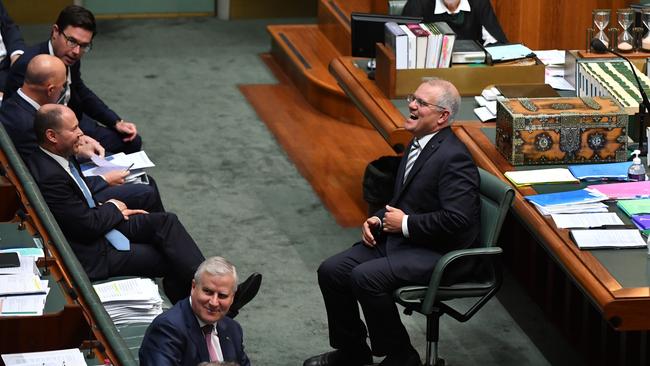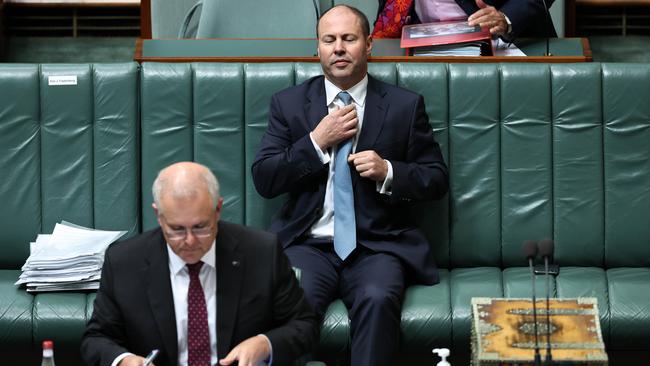Budget buzz can’t hide a deficit of morality
No Coalition budget handed down should avoid mention of the elephant in the room.

Prior to that the Coalition had a long track record of whingeing about debt being built up during Labor’s time in power. John Howard’s opposition did it in the lead-up to the 1996 election, continuing the attacks in the aftermath of that victory as a warning to voters not to risk a return to Labor.
When Tony Abbott was opposition leader the talk emanating from his team was of a “debt-and-deficit disaster” courtesy of Labor spending. What Australia would give now for the low debt levels back then.
During the global financial crisis the then Coalition opposition lampooned Labor for overspending, including attacking specific schemes for waste or poor design. That appears extra hypocritical now, in the context of pandemic spending and, for example, the design principles behind the JobKeeper scheme, which didn’t even require profitable businesses to pay the money back if their fortunes turned around.
Despite countless Coalition attacks about debt and deficits, the deficit is higher now than at any point in Australian history. Tuesday’s budget is expected to see some improvements but, again, deficits will be the order of the day across the forward estimates.
So I simply ask readers to note that while there is much the Coalition can be proud of when it comes to managing the economy through the pandemic, the build-up of debt, necessary as it might have been, exposes the vacuous nature of past Coalition rhetoric, as well as the hypocrisy of conservative political attacks.
That said, Josh Frydenberg has done well as Treasurer. The speed of his response during the pandemic ensured that jobs losses were contained and spending was prioritised. Of course, hindsight allows us to look at ways that things could have been done better but, compared with other nations, Australia’s economy withstood the initial downturn well, and we appear well placed to manage the growth now threatening to put upward pressure on inflation and interest rates.

The perennial issue for modern governments come budget time is how to recalibrate tax and spending settings to better serve the economy. While the appetite for major reform is low in voter land, and even lower in the corridors of power, Frydenberg did an admirable job embarking on a variety of budget changes last year that have helped set up this year’s budget.
We are now expecting reforms in the areas of childcare, aged care and broader adjustments to incentivise businesses to invest; for example, the expansion of the First Home Loan Deposit Scheme, the instant asset write-off (for companies up to $5bn) and tax loss carry backs. One of the principles Frydenberg has dragged his non-ideological Prime Minister towards is that of giving the private sector the policy tools it needs to stimulate growth, rather than simply relying on the public sector to do the heavy lifting.
And don’t forget major income tax changes remain in the pipeline. Labor has sought to paint the cuts as akin to flattening the tax rate in an un-egalitarian way, but just watch as the opposition in reply to the budget doesn’t come close to announcing plans to cancel said income tax cuts.
Anthony Albanese wants to narrow the differences between the Coalition and Labor on economic management, not exacerbate them. This has created an interesting tension within the opposition between leader and shadow treasurer. Jim Chalmers, who has his own ambitions to lead Labor one day and is a protege of former treasurer Wayne Swan, doesn’t want Labor to simply become Liberal-lite.
But Chalmers has time on his side. If Albanese finds a way to win, Chalmers gets to be Treasurer in his mid-40s. If Labor loses, the Queenslander becomes a viable leadership option right at a time when Labor would need to swing the Sunshine State its way to reclaim government.
Albanese might be the Labor MP who gets on the best with Kevin Rudd, but Chalmers is the one more likely to emulate his 2007 achievement. That said, Albanese is trying, and his speech this week presenting a fiscally conservative mantra is designed to deflate government attacks on Labor over the economy. For his part, Chalmers may need to decide between his ideological leanings on economic reform and his capacity to cash in electorally on being a Queenslander.
Queenslanders prefer the conservative brand of economic management to that of Labor.
To be sure, these distinctions are political and superficial. Dry economics isn’t really popular anywhere around the country. What is popular, especially in states such as Queensland and WA, where the Coalition holds the lion’s share of seats, is the perception of cautious economic management. Which is why Frydenberg, when he stands up on Tuesday night, will focus on employment, low unemployment, the productivity growth helping drive the economic recovery and policies that support business.
Don’t expect to hear too much about the growing debt, which by the way has more than doubled since the Coalition came to power and is set to double again according to the forward projections.
On a separate note, I couldn’t finish this column without noting the shameful way the government responded to the situation Australians in India face. A late-night press release deliberately worded to accentuate tough criminal sanctions on Australian citizens who try and return home. Highlighting the possibility of jail time.
When there was a backlash, the PM forgets about the rule of law and the separation of powers to declare no one is likely to incur such penalties. That’s not his job. Then the government is shamed into planning repatriation flights. Next, the government, without a hint of shame, accuses the media of beating up the penalties the Health Minister’s own media release sought to highlight.
And this whole sorry saga has exposed the vulnerabilities of hotel quarantine and the slowness to action by the commonwealth in setting up purpose-built quarantine centres experts have long been calling for. And what about the irony? A political party that made such political mileage over the years with tough border policies for refugees loses the whip hand to Labor states when they develop tough state border policies the feds opposed during the pandemic, only to re-engage with tough border policies, but it overextends to the point where conservative commentator Andrew Bolt accuses Scott Morrison of racism. If the Coalition had hoped to move on from a difficult few months to focus attention on the budget, the woeful and heartless response to citizens stuck abroad put paid to that.
Peter van Onselen is a professor of politics and public policy and the University of Western Australia and Griffith University.




No Coalition budget handed down should avoid mention of the elephant in the room. That is, the build-up of debt. Ahead of the 2019 budget, the government bragged about the budget being “back in black”, which it wasn’t and, courtesy of events, probably never will be on its watch.